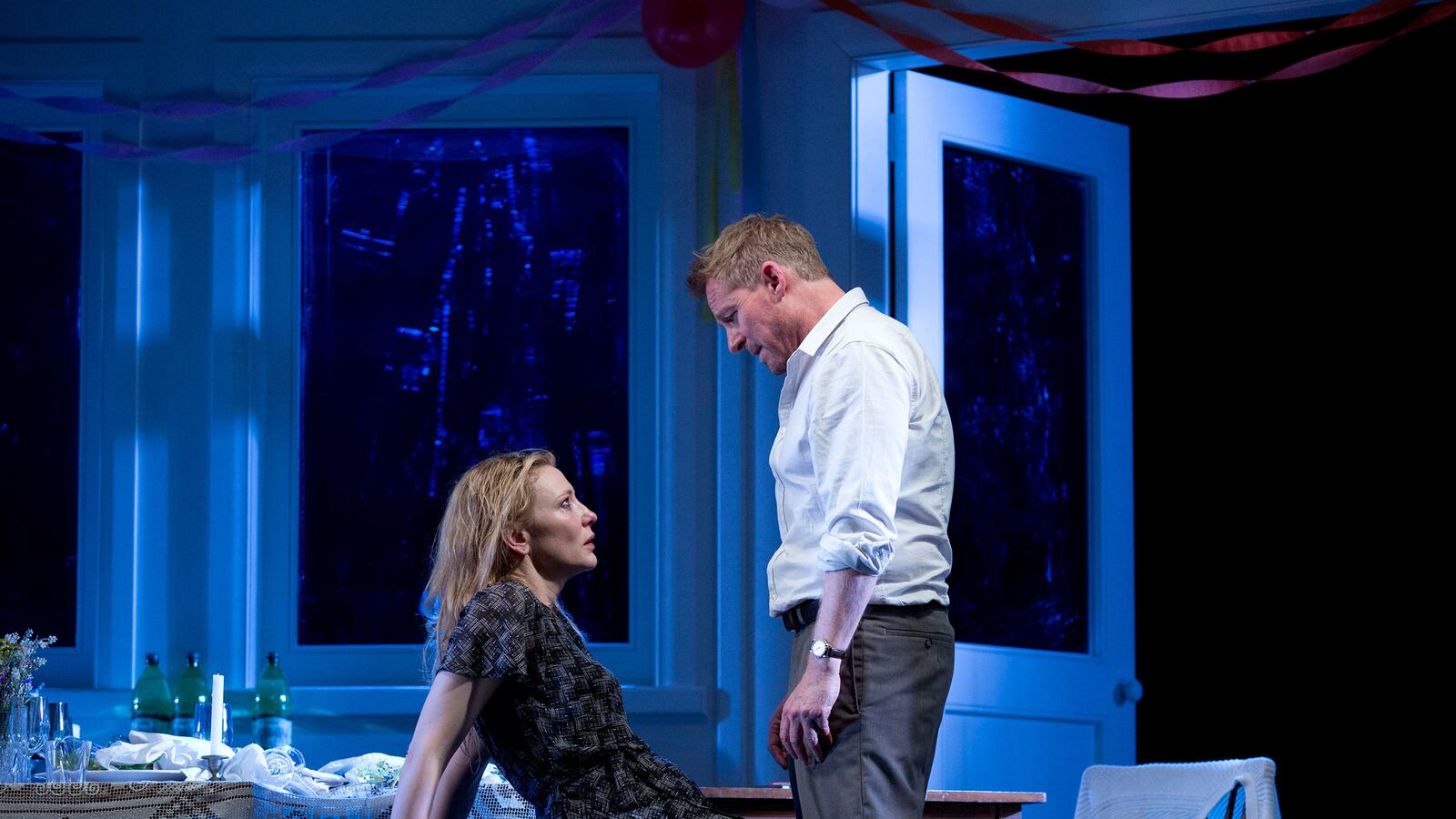Yes, that really is Cate Blanchett on top of a table dancing to thunderous pop music. Yes, she has got a gun. Yes, she will fire it into the eaves of the theater. And yes, her character, Anna Petrovna, has just told everyone else at her 40th birthday party that she has rigged the folly—in which this chaotically louche group is drinking and carousing—with explosives. And yes, Anna has a detonator, and yes her finger is about to press down on the button. She means business.
Andrew Upton’s The Present, an adaptation of Chekhov’s Platonov (dated to the early 1880s, discovered in 1920, and Chekhov’s first full-length play), is uproarious, fast, and funny.
In John Crowley’s Broadway production—handsomely designed and costumed by Alice Babidge—there are none of the long skirts and even longer pauses one typically expects from Chekhov. Upton, who is married to Blanchett, has set this Sydney Theatre Company production in 1990s Russia, and though the play is focused on the romantic and personal travails of the group gathered to celebrate Anna’s birthday at her country house, the theme of money—making it, losing it, the possibility of having lots of it—speaks to a modern social order in transition.
Soigné queen of all she surveys Anna may seem, but—a widow after the death of her husband, “the General”—she is maneuvering herself to make a material choice in marriage between the rich landowners Yegor (David Downer) and Alexei (Martin Jacobs). She may have the demeanor of a master puppeteer, but she herself has all-too-heartbreakingly pliable strings to be pulled.
Of course, the audience’s attention is taken up with Blanchett, whatever she is doing. She is transfixing, utterly in command of the stage and the emotional tides of her character; she flits from bored and restless to gossip maven, to counselor and party queen.
Amid the backchat and flirting and dancing of the first act, the lovelorn heart of the play is revealed as the never-was relationship between Anna and Mikhail (Richard Roxburgh). For much of the play they are the sexiest of Shakespearean couples-that-should: sparring, playful, wistful, and a true match for one another intellectually as well as intimately.
This is not Blanchett and Roxburgh’s first time at the Chekhov rodeo, and their familiarity bears colorful and energetic dividends.
Anna and Mikhail and the others are also victims of time, the play’s other predominant theme. The characters’ turning 40 turns their minds to what has been lost, to what could have been—and so as well as balloons and dirty dancing and Joy Division (“Love Will Tear Us Apart” is chosen as a key track of course) there is a clock ticking. And it is a tragic one. We know that immediately because one of the first things we see is a gun.
The portent is obvious, though far from undermining of the shenanigans that are played out. The characters speak over one another. Time is at a gallop and provisional, as are the characters’ dreams and destinies.
Roxburgh is a brilliant, charismatic firecracker match for Blanchett. He plausibly plays the doting father and loyal husband to Sasha (Susan Prior)—at least in intention—as well as the craven man-slut. If his heart belongs to Anna, his groin belongs to anything in a skirt. And perhaps he devotes so much time to these carnal pursuits because, a schoolteacher, he is frustrated never to have made it as a writer.
Desire is a mordantly played game to Mikhail, but not for Sophia (Jacqueline McKenzie), who is married to Sergei (Chris Ryan), who is cuckholded right in front of himself. He is a good man, but one not hardwired to fight. His confusion as his marriage slips away from him is sad and frustrating to observe. The romance of Nikolai, Anna’s stepson (Toby Schmitz), with Maria (Anna Bamford) is also about to hit some Mikhail-shaped rocks.
The second act sees a chaotic pile-up around Mikhail. He, a dizzying volcano of battered and hilarious, and sad and frustrated, doesn’t know what to do as all the dysfunction around him swirls in an appositely swirling mist, especially when he is confronted over his transgressions by the menacing Osip (Andrew Buchanan).
You laugh at all this misbehavior, cringe at it, and even feel for those caught up in the mess—just as, when the company is doing its crazy dancing, we are laughing and yet slightly disturbed by the sexual configurations in the group. There, Sergei finds himself an interloping number three to his own wife and Mikhail; Anna is dry-humped by one of the landowners, and the brattish, horny Kirill (Eamon Farren) tries to seduce her.
Tonally, the lightning shifts from humor to pathos to profundity in this scene is the register of the production as a whole, and sometimes that can be discombobulating. The earthy Australian accents and dialogue are also at a mischievous variance to the stateliness of Chekhov. If you don’t acclimatize to these stylistic tinkerings, you may find yourself lost.
Indeed, when the tragedy of the conclusion unfolds, it happens a little too quickly on the heels of the farce that precedes it. But Blanchett (by now in a cream sweater that is so gorgeous it deserves its own standing ovation), Roxburgh and their fellows anchor the shift in mood ably as it fades to sad silence. Time comes to a standstill at the end of The Present, but you hope, for all of those left breathing, that one day they’ll dance on tables again.
The Present is at the Barrymore Theatre until March 19. Book tickets here.






